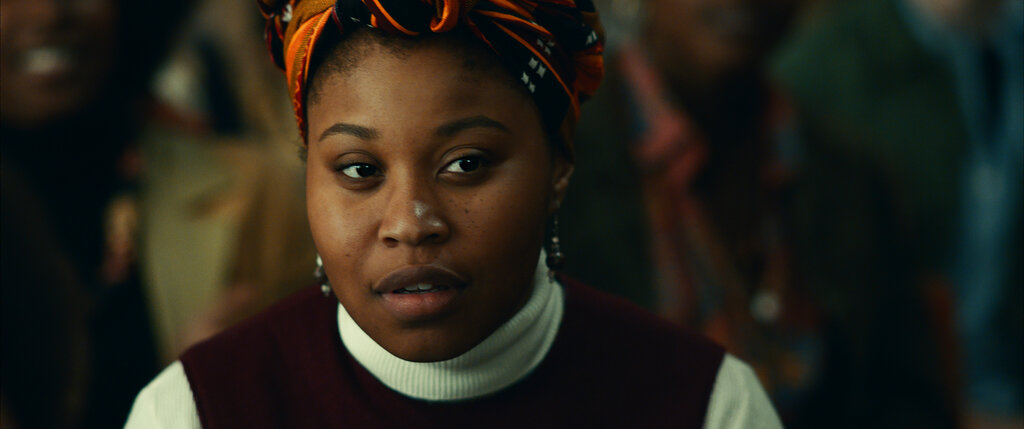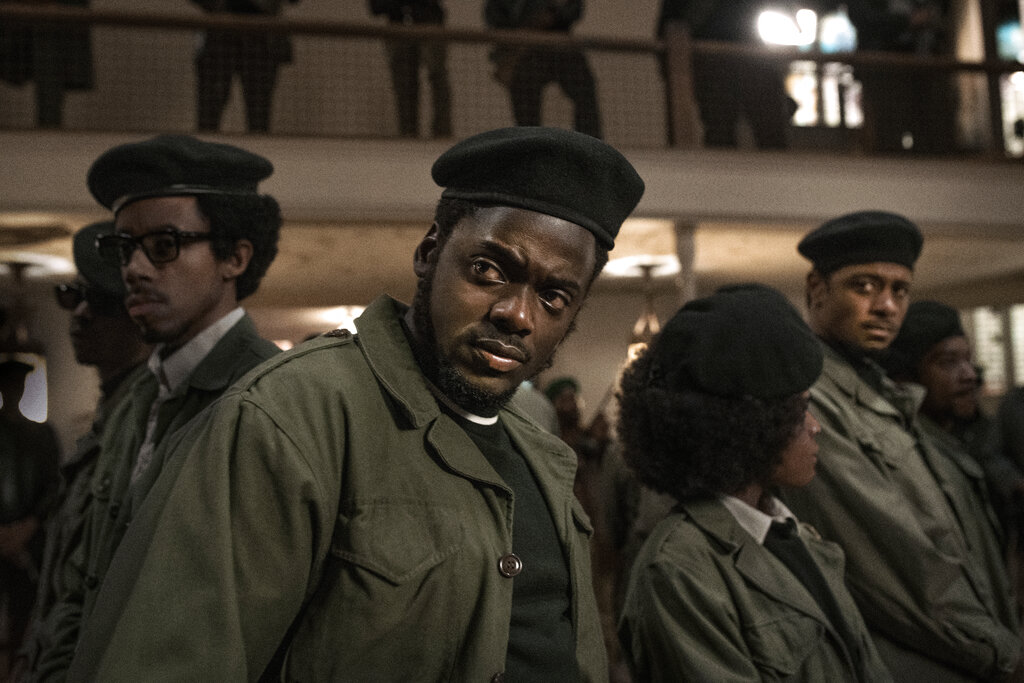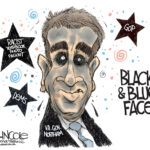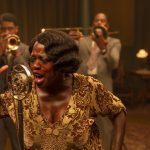Joe’s Take
A few months ago, Netflix released “The Trial of the Chicago 7,” which glosses over the Black Panther Party and one of its founders Bobby Seale. While a scene from that film is mentioned in “Judas and the Black Messiah,” the Warner Bros./HBO Max film centers on the Illinois Black Panther Party in the 1960s and depicts the racial injustice that proves eerily similar to the issues that still plague this country.
“Judas and the Black Messiah” does an excellent job taking on the topic of racial inequality by focusing on its characters and establishing a universal theme. Whether the character was one of the major players or part of a subplot, each one faced a decision we all understand, a decision between doing what is right or acting in self-preservation. Everything builds beautifully off that central idea.
Bill O’Neal (LaKeith Stanfield) must decide whether to accept a prison sentence or work undercover with the FBI against a cause he would support. Working against his beliefs would not only keep him out of prison, but also put money in his pocket. Chairman of the Illinois Black Panther Party Fred Hampton (Daniel Kaluuya) works to unite and protect the people, but his efforts put him in harm’s way. FBI agent Roy Mitchell (Jesse Plemons) knows his job is to protect and serve, but will he stick to his morals when challenged by his superior officers?
Now that the film gives the audience the different perspectives, it understands the decisions made, whether it agrees with them or not. As the characters struggle between self-preservation and moral obligation, I noticed something else that still resonates today. Throughout the film, characters so easily speak things into existence or throw labels on people or a group. That becomes how society knows certain groups without looking into the facts.
Early in the film, Mitchell labels the Ku Klux Klan as equal to the Black Panther Party, saying both are terrorist organizations. He adds that he’s for racial equality, but not through cheating the system. J. Edgar Hoover (Martin Sheen) kicks off the film saying it is important that the FBI doesn’t allow any “Black Messiahs” to rise to power because it will be dangerous to the country. The FBI and the cops say Hampton’s tone when he orates is violently charged while missing the eloquence of what he’s saying. None of it is true, but when coming from a man in a position of power with perceived intelligence it becomes accepted as gospel. There’s another part of the film where a character kills cops before the cops eventually kill him. His mother doesn’t want him remembered as a cop killer, because there’s so much more to him. The audience knows this, but most of the world will only know him as a cop killer. This also resonates today with cancel culture and judging a situation without all the facts.
The filmmakers lay that groundwork beautifully so their stars can shine. Stanfield and Kaluuya, who last shared the screen in 2017 with Stanfield screaming at Kaluuya to “Get out!,” did just that. Stanfield captures O’Neal’s internal struggle as he tries to preserve his future, while hoping he can eventually break free from his undercover assignment. Wavering and sometimes on the verge of tears, Stanfield shows the audience his emotional state with his face and body language. He also displays the character’s mental instability. Despite his scary situation, he’ll smirk when he succeeds.
An Oscar nominated actor, Kaluuya eyes at least another nomination with his role as Hampton. He performs phenomenally as an orator, especially toward the end of the film when he gives his “I am a revolutionary” speech. He sparks one of the best scenes of the film with his booming voice and eloquent delivery. What puts his performance among the greats of the extended 2020 movie season is his range in producing a powerful character with a presence balanced with grace, sensitivity and vulnerability when out of the public eye. He builds a beautiful chemistry with Dominique Fishback (Hampton’s love interest Deborah Johnson), which adds a layer to his character.
Fishback shines as well in a supporting role. Her reactions during the “I am a revolutionary” speech and her voiceover during a police shootout add to the impact of both sequences. Her character shares Hampton’s struggle, as she has a baby on the way when Hampton is a target of law enforcement. Plemons as Mitchell fits perfectly into his role, which is right in his wheelhouse.
Shaka King’s direction stood out as well. I keep coming back to this, but during the “I am a revolutionary” speech King balances so much as the film’s major players find themselves in the same room. It epitomizes what he was able to do throughout the movie. While Hampton orates, the scene creates so much exuberance and tension simultaneously. Most of the interaction is communicated nonverbally. An undercover O’Neal sees his FBI boss Mitchell in the crowd and they stare at either. As Hampton mentions death or murder, Johnson struggles to hold back tears as she fears the father of her child’s fate. Once enemies of Hampton, the Crowns in the audience are seen showing more and more support as Hampton orates. It’s a lot to accomplish in one scene. Also, King doesn’t glorify the gun fights, instead making them raw and allowing the audience to feel the impact.
This isn’t a negative to the film, but it is a personal preference. Watching Sheen as Hoover made me uncomfortable. I think of Sheen as President Josiah Bartlet of “The West Wing,” not an evil FBI director. Like I said, this isn’t a real issue because he plays the role well. It just wouldn’t be a Joe review if I didn’t mention an Aaron Sorkin project … or in this case two.
“Judas and the Black Messiah” creates a beautiful setup that engages the audience and enables its actors to shine. It explores racial injustice through a thoughtful and raw lens. The filmmakers add expert storytelling, dialogue and direction that give the movie layers, relevance to today and reasons to watch it again.
4.5 out of 5 stars

Dominique Fishback stars in “Judas and the Black Messiah.” (Warner Bros. Pictures via AP)
Rebecca’s Take
Sometimes synergy is undeniable. At Take 2 Blog, we’ve reviewed several films in the last few months that have taken on racial injustice while our country found itself struggling to answer for it. “The Trial of the Chicago 7,” “One Night in Miami” and “Judas and the Black Messiah” are set during the civil rights movement of the 1960s, with interlocking themes and references to historic figures – and even the appearance of one across two films.
All three are powerful. All three are relevant. And now “Judas and the Black Messiah,” streaming on HBO Max, caps the unofficial trilogy with an unapologetic bang. Featuring dynamic performances, the incendiary drama strikes the right balance between its stirring speeches and relentless action. “Judas and the Black Messiah” resonates as our nation tries to pick up the pieces after a tumultuous year.
The biopic follows the events leading up to the 1969 assassination of Fred Hampton (Daniel Kaluuya), the leader of the Illinois Black Panther Party. Seeing Hampton as a threat, the FBI recruits Bill O’Neal (LaKeith Stanfield), a car thief who wants to evade prison. As O’Neal gets closer to Hampton, he feeds the FBI information on the community activist. But when O’Neal realizes the agency wants Hampton dead, the conflicted informant ultimately betrays the Panthers leader.
This isn’t the first time movie viewers have encountered Hampton. The historical figure briefly appeared in “The Trial of the Chicago 7,” offering support to defendant Bobby Seale. But “Judas and the Black Messiah” gives the Panthers leader his time to shine. The excellent Kaluuya delivers an Oscar-worthy performance as he brings the revolutionary to life.
Kaluuya, who was down-to-earth in “Get Out” and terrifying in “Widows,” exudes charisma as the crusading Hampton. Poetic and disarming, Hampton holds a palpable sway over the Panthers. He’s so magnetic that he convinces rival groups, including the Crowns, to join them. During his speeches, Kaluuya is forceful and strong. But he also taps into Hampton’s humanity and warmth. He cares for his fellow Panthers like family. When he calls them “brothers” and “sisters,” you believe it. The actor makes the legendary figure feel like a real person.
Audiences learn more about Hampton through the relationship he forms with fellow activist Deborah Johnson (Dominique Fishback). A standout in “Project Power,” Fishback plays a pivotal role here as much of the story is told from her point of view. Through closeups, Fishback says a lot through her eyes and expressions. When Hampton speaks about his willingness to lay down his life for the cause, terror washes over Deborah’s face as she’s pregnant with his child. She supports and challenges Hampton, and she’s not afraid to question him.
“Judas and the Black Messiah” emerges as especially timely, shining a spotlight on police brutality. A heart-pumping shootout at the Panthers headquarters between members and police ramps up the tension, leading to a jaw-dropping explosion. Hampton was only 21 years old when he was murdered in a hail of gunfire by police. The harrowing finale is downright brutal, with flying bullets and fearful pleas. It’s uncomfortable and shocking, and it’s supposed to be.
More than 50 years later, the shooting of Black men by law enforcement has galvanized the nation. When O’Neal, who used a fake FBI badge to steal cars, says “a badge is scarier than a gun,” the sentiment lands with frightening accuracy. Daring director and co-writer Shaka King holds up a mirror to today’s fraught state of race relations.
The drama explores the government’s fear of Black leaders. While Malcolm X kept looking over his shoulder for the G-men in “One Night in Miami,” the FBI has a more visible role in “Judas and the Black Messiah.” The agency considers the Panthers the biggest threat to the nation’s security. But that’s not what we see onscreen. Instead, we see the Panthers working to provide meals, legal aid and educational programs for families.
When FBI Director J. Edgar Hoover (Martin Sheen in very heavy makeup) wants Hampton killed, he has to convince O’Neal’s handler, Roy Mitchell (Jesse Plemons). The film plays on the disconnect between what the Black Panthers are trying to do and what the government proclaims them to be. “Judas and the Black Messiah” lets viewers judge the group – and the government – for themselves.
What ends up hurting “Judas and the Black Messiah” is its Judas. This is not a knock on the phenomenal Stanfield, but rather O’Neal’s underwritten character. It’s hard to get a good sense of his struggle between his duties as an informant and his so-called loyalty to the Panthers because the film doesn’t delve into the conflict as much as it could have. We see the self-serving O’Neal mostly looking out for himself, asking Mitchell for money for the information he provides. I expected the movie to show a closer bond between him and Hampton, but it didn’t. This would have amplified his already devastating betrayal.
Despite the script’s shortcomings, Stanfield’s fantastic acting allows the character’s conflict to come through. The actor lets the apprehension creep into his face when he’s asked to hotwire a car. He nervously laughs after swearing to go after any rats, and he swells up with tears before leaving Hampton to his fate. His talent goes a long way to fill the gaps in character development.
Eye-opening and tragic, “Judas and the Black Messiah” questions how far we’ve come in terms of race relations. The film complements “The Trial of the Chicago 7” and “One Night in Miami” as a gauge of our country’s progress. King’s bold biopic features outstanding performances by several rising stars, including Kaluuya’s award-worthy turn as the ill-fated Fred Hampton. The timely drama strikes at the heart of ongoing racial strife, showing that the past can repeat itself – for better or worse. “Judas and the Black Messiah” challenges us to learn from the past and continue the fight for a better future.
4 out of 5 stars

Rebecca Kivak and Joe Baress write about movies for Take 2 blog. Together, they review current flicks and offer their insights into the latest movie news. Rebecca is a copy editor and page designer at The Times-Tribune. She started her career with Times-Shamrock Newspapers in 2005 and has won several professional journalism awards for page design and headline writing. She also covers NASCAR races from Pocono Raceway. Contact: rkivak@timesshamrock.com; 570-348-9100 x5126; @TTRebeccaKivak




